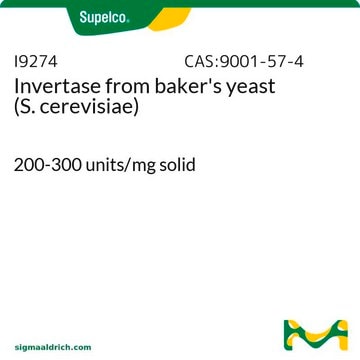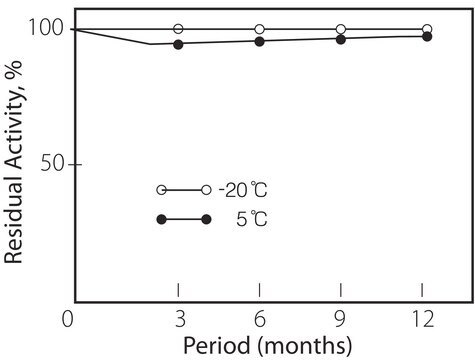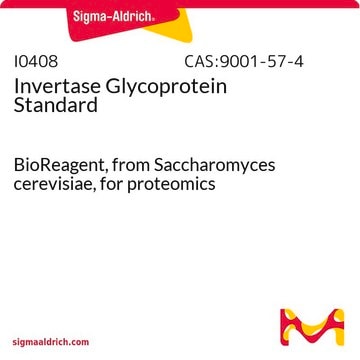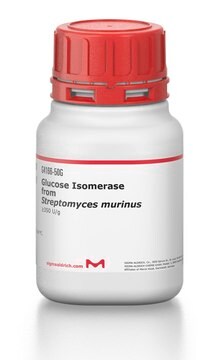I4504
Invertase from baker′s yeast (S. cerevisiae)
Grade VII, ≥300 units/mg solid
Synonym(s):
β-D-Fructofuranosidase, β-D-Fructofuranoside fructohydrolase, Saccharase
Sign Into View Organizational & Contract Pricing
All Photos(3)
About This Item
Recommended Products
biological source
bakers yeast
type
Grade VII
form
solid
specific activity
≥300 units/mg solid
foreign activity
α-galactosidase (melibiase) ≤0.01%
storage temp.
−20°C
Looking for similar products? Visit Product Comparison Guide
Related Categories
Application
Used in the production of confectionary foods and artificial honey.
Biochem/physiol Actions
Invertase hydrolyzes sucrose into glucose and fructose yielding a colorless product, unlike acid hydrolysis which produces colored products.
Unit Definition
One unit will hydrolyze 1.0 μmole of sucrose to invert sugar per min at pH 4.5 at 55°C.
Signal Word
Danger
Hazard Statements
Precautionary Statements
Hazard Classifications
Resp. Sens. 1
Storage Class Code
10 - Combustible liquids
WGK
WGK 3
Personal Protective Equipment
dust mask type N95 (US), Eyeshields, Gloves
Certificates of Analysis (COA)
Search for Certificates of Analysis (COA) by entering the products Lot/Batch Number. Lot and Batch Numbers can be found on a product’s label following the words ‘Lot’ or ‘Batch’.
Already Own This Product?
Find documentation for the products that you have recently purchased in the Document Library.
Customers Also Viewed
Tatiana Q Aguiar et al.
Molecular biotechnology, 56(6), 524-534 (2014-01-24)
The repertoire of hydrolytic enzymes natively secreted by the filamentous fungus Ashbya (Eremothecium) gossypii has been poorly explored. Here, an invertase secreted by this flavinogenic fungus was for the first time molecularly and functionally characterized. Invertase activity was detected in
Derek Fleming et al.
Biofilm, 2, 100037-100037 (2021-01-16)
The complexity of microbial biofilms offers several challenges to the use of traditional means of microbial research. In particular, it can be difficult to calculate accurate numbers of biofilm bacteria, because even after thorough homogenization or sonication, small pieces of
Frida I Piper et al.
Tree physiology, 37(8), 1001-1010 (2017-05-27)
Since growth is more sensitive to drought than photosynthesis, trees inhabiting dry regions are expected to exhibit higher carbohydrate storage and less growth than their conspecifics from more humid regions. However, the same pattern can be the result of different
Misa Sandri et al.
Animal nutrition (Zhongguo xu mu shou yi xue hui), 6(3), 353-361 (2020-10-03)
A dietary intervention study was assessed to determine if different sources of starch in homemade diets could significantly modify fecal microbiome of dogs. Twenty-seven adult dogs were enrolled and fed a diet based on a mixture of rice and pasta
Ali Soltani et al.
BMC genomics, 20(1), 312-312 (2019-04-25)
Climate change models predict more frequent incidents of heat stress worldwide. This trend will contribute to food insecurity, particularly for some of the most vulnerable regions, by limiting the productivity of crops. Despite its great importance, there is a limited
Our team of scientists has experience in all areas of research including Life Science, Material Science, Chemical Synthesis, Chromatography, Analytical and many others.
Contact Technical Service











